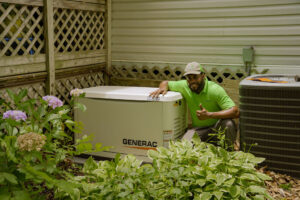When it comes to keeping your home safe and comfortable during power outages, choosing the right generator size is one of the most important decisions you can make. Whether you’re preparing for storm season or want peace of mind year-round, selecting the right system ensures that your essential appliances run smoothly without wasting energy or money. If you’re searching for a reliable generator in Mississippi, AirSouth Cooling and Heating is here to help you make the best choice for your home and family.
Why Generator Size Matters
Generators aren’t one-size-fits-all. The size of your generator determines how much power it can produce, which directly affects how well your home functions during an outage. A generator that’s too small won’t handle the load of your appliances, while one that’s too large can result in unnecessary fuel use and higher installation costs. The goal is to find the perfect balance between capacity, efficiency, and cost.
Step 1: Determine Your Power Needs
Start by identifying which appliances and systems you want to power during an outage. Do you want to keep just the essentials—like lights, refrigerator, and HVAC system—running? Or do you want full-home coverage, including entertainment systems and major appliances?
List out all the devices you’ll need and note their wattage requirements. Most appliances have a label showing the watts needed to start and run. Add up those numbers to get an estimate of your total power demand. AirSouth can help you perform this load calculation to ensure your generator is properly sized.
Step 2: Understand Generator Types
Generators come in two main types: portable and standby.
- Portable generators are smaller, cost-effective, and ideal for powering a few key appliances. They’re a great temporary solution, but require manual setup and refueling.
- Standby generators automatically turn on when the power goes out, providing seamless and continuous power. These units are permanently installed outside your home and connected directly to your electrical system.
If you experience frequent outages or want total comfort and safety during storms, a standby generator is usually the better investment.
Step 3: Match the Generator to Your Home Size
As a general rule of thumb:
- A 5,000–7,500-watt generator can power small to medium-sized homes’ essentials.
- A 10,000–20,000-watt unit can power most household systems, including HVAC and water heaters.
- Larger homes or those with high-power demands may need 20,000+ watts for complete coverage.
AirSouth Cooling and Heating’s experts can evaluate your home’s specific needs and recommend the ideal size for optimal performance and reliability.
Step 4: Consult the Professionals
Choosing the right generator involves more than just wattage—it requires understanding fuel types, electrical connections, and installation codes. Our certified technicians will guide you through every step, from selecting the right model to expert installation and maintenance.
At AirSouth Cooling and Heating, we know Mississippi weather can be unpredictable—but your power doesn’t have to be. Let our team help you find the perfect generator to keep your home powered and your family protected.
Schedule service at your earliest convenience with AirSouth Cooling and Heating.








